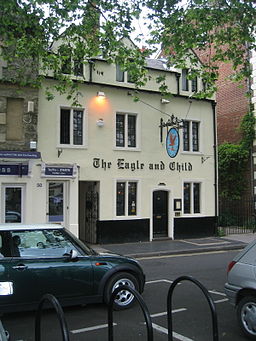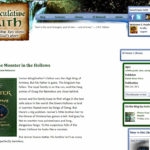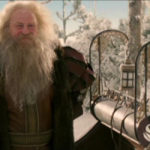The Continued Search For The Next C. S. Lewis
 From time to time I’ve decried the marketing ploy that advertises an author as the next C. S. Lewis or the next J. R. R. Tolkien. Those greats are matchless, in my view, and we aren’t going to see The Next, as if they were simply links in a long chain of literary figures accomplishing more or less the same thing in their generation as those who went before and who will go after.
From time to time I’ve decried the marketing ploy that advertises an author as the next C. S. Lewis or the next J. R. R. Tolkien. Those greats are matchless, in my view, and we aren’t going to see The Next, as if they were simply links in a long chain of literary figures accomplishing more or less the same thing in their generation as those who went before and who will go after.
Recently, however, I read an article by Christopher Mitchell, professor at Biola University’s Torrey Honors Institute, entitled “Still Looking for C. S. Lewis.” In it, he explores what C. S. Lewis gave the world and whether looking for another C. S. Lewis is asking for too much.
Dr. Mitchell’s opening caught my attention at once. He relates how for the past two decades he regularly has entertained the question, where are the C. S. Lewises of our day?
As I see it, then, on one hand marketing people are saying, here is the next C. S. Lewis, and on the other, everyday Christians are saying, where is the next C. S. Lewis? Either the everyday people are not listening to the marketers, the marketers aren’t speaking to the everyday people, or the two simply disagree.
I suspect there is truth in all three aspects. First, these marketers are speaking to a fairly small crowd–those who frequent Christian book stores and who pull a book by an unknown author off the shelf to read the back cover copy, because honestly, that’s about the extent of the marketers’ reach when it comes to Christian fantasy.
In addition, everyday people are not listening to the marketers. For one thing, they have become, by necessity, fairly jaded when it comes to marketing. In part they are adept at looking past it. But if they should allow marketing to penetrate their thinking, they are just as apt to be skeptical about what they’re told as they are impressed by it.
Consequently, any book with the claim that its author is the next C. S. Lewis had better prove it within the first few pages because, if the writing isn’t there, readers who turn to the first chapter will surely conclude the back cover is typical marketing hyperbole.
Thirdly, the marketers and the everyday people seem to be in disagreement about what they’re looking for. This point, I believe, is critical.
Are everyday people looking for stories set in a make-believe world like Narnia? Do they want books they can read to their children? Are they looking for stories with allegorical meaning like The Great Divorce? A Christian-ized retelling of a Greek myth in the vein of Till We Have Faces? A space-travel story about aliens, with Christian implications?
My guess is, those things are what marketers believe readers want in the “next C. S. Lewis,” but I suspect they miss the mark. Readers aren’t so much looking for the same kinds of stories as they are the same depth of story telling.
 Lewis’s depth first came from his interaction with Scripture, evidenced by his non-fiction apologetic works. Certainly his imaginative thinking also benefited from his interaction with his colleagues at Oxford, particularly those in the Inklings. In other words, his fiction did not spring to life in a vacuum, nor did it germinate exclusively from the fertile soil of his own imagination.
Lewis’s depth first came from his interaction with Scripture, evidenced by his non-fiction apologetic works. Certainly his imaginative thinking also benefited from his interaction with his colleagues at Oxford, particularly those in the Inklings. In other words, his fiction did not spring to life in a vacuum, nor did it germinate exclusively from the fertile soil of his own imagination.
Rather, Lewis read widely, studied profusely, and spent hours discussing literature and theology with other scholars. Dr. Mitchell summed up Lewis’s ability as “a rare combination of theological reflection and poetic imagination.”
Perhaps he also enjoyed the rare environment of Oxford at the rare time of the post-World War II era.
But aren’t all times and environments rare in their own ways? I can only imagine what Lewis would have done if he’d had the opportunity to express his ideas in Facebook updates or Tweet his thoughts. The latter seems almost laughable, except for the fact that Lewis is so eminently quotable. His ideas are expansive, and he took books to explain his positions, and yet he had the knack of encapsulating deep truths in a sound bite.
In the end, I don’t think writers today should try to emulate Lewis’s stories or writing practices and certainly not his style. Rather, I think those everyday people looking for “the next Lewis” are actually looking for a writer whose fiction opens up spiritual reality the way Lewis’s does.
Of Lewis’s non-fiction, Mitchell says,
In addition to Lewis’ remarkable ability to translate Christian doctrine into lively, jargon-free, accessible prose, he also succeeded in communicating its essential depth and substance, turning what had become for many a mere religious relic into a potentially potent spiritual reality.
I suggest his fiction accomplished the exact same thing. This “next C. S. Lewis,” then, must delve into the depth of Christian doctrine and learn how to translate it into potent spiritual reality through the vehicle of stories. And that, I believe, is precisely what everyday people are looking for.











































Excellent article. I am looking forward to reading the essay you referenced as well.
Thanks, Lacee. Here’s the line I like most in Dr. Mitchell’s article–I could do a whole blog post on this alone:
As I read that, I’m thinking, Exactly!
Becky
I’m currently taking a topics in literature class on C.S. Lewis, and one of the things I brought up was how wide-ranging Lewis is. We have a satirical epistolary novel, “children’s” fantasy, a science fiction trilogy, what might be considered ‘literary’ fiction with a mythological basis, apologetic, nonfiction essays, literary criticism/history, and more.
I think the days of such broad authorship has passed, partially due to increasing specialization in publishing and also to narrower education. How many college graduates today read the Illiad or Homer or Milton, unless they’re literature majors? We won’t get another Lewis, because that background is gone. We may find some of his aspects in other writers (theology directed at the layman, etc), but all those traits in one man?
I think you’re right, but don’t attribute everything to Lewis’s academic environment. That would diminish the uniquenesses of the man himself that made just about all Christians like him. He was a deep philosophical thinker, but he was also an unshakable optimist. He was easily understandable but also intellectual. His arguments were probably controversial and radical to the academia that he was a part of, but he was rarely condemned anyone by name and was almost never cynical.
I think some people may find a writer who is a modern C.S. Lewis for them, but the appeal of modern writers is probably generally less than Lewis’s near-universal Christian appeal. In the realm of nonfiction, there is a writer who has affected much the same way that Lewis has, but speaking to me in the context of my own time and culture. For fiction, I’m still waiting for The Next Tolkien. 😉
As much as I love talking animals in fantasy and sci-fi form, Till We Have Faces is probably my favorite. We had some good play between the id/ego/superego of Bardia, Orual, and the Fox in regards to religion (not to mention a healthy dose of Greek philosophy and Fisher-King mythos), the most developed exploration of Lewis’s mini-trope of the possessive mother, and probably the most accurate representation of an early Iron Age society in Europe that I’ve ever seen in fiction. But what’s pretty funny is that you could chop off the second part of the book (or maybe just include the revelation of Orual’s possessiveness before the trippy dream-myth stuff) and have a pretty TS Eliot-y, Modernistic work.
Notleia, Till We Have Faces is my favorite Lewis, too, but it is because of the “trippy dream-myth stuff.” 😉 The story up to that point is strong, but that segment baptizes it in truth, I think. And when you say TS Eliot-y, I’m assuming you mean pre-conversion, am I right?
Becky
Yeah, I had “The Waste Land” in mind when making the Eliot comparison (though even after conversion he still seemed pretty melancholy [and eternally drowned in marginfulls of references]).
As for me–I want reading that is new, different and amazing. No one can be____. God created who is for their moment in time–there is no going backward, only forward. No one can be duplicated and that’s a blessing.
One of your best blogs, Becky. I think you went right to the heart of the issue.
Thanks, Carol. I’d be curious what you think of Galadriel’s idea that specialization has put to death the kind of thinker and writer who may have become the next C. S. Lewis. I’m still mulling that one over.
Becky
Dr. Mitchell did point out Lewis’s ability to steer clear of “Christian controversy” by focusing on “mere” Christianity–the doctrines we hold in common. He also noted his ability to cover deep concepts in a clear way, quoting Dorothy Sayers’ praise of him for this very thing:
I can see a writer in our time accomplishing this kind of thing, but I’m wondering if the gulf between people with a Christian worldview and those with a different framework would make it too hard for such a writer to have universal appeal.
Becky